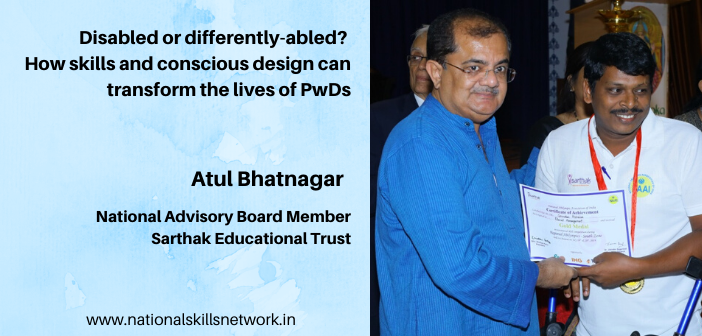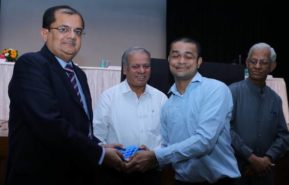In a world where Persons with Disability (PwD) are vulnerable, Sarthak Educational Trust is continuously striving and succeeding in providing them better opportunities with knowledge and skills that can ensure a dignified life and sustainable income. Being a National Advisory Board member of Sarthak, we invited Mr Atul Bhatnagar, Consultant, for a Skill Talk on making the world a more inclusive place for PwDs. Let’s read further to understand the issue therein and reflect on Mr. Bhatnagar’s insights.
Q: Could you tell us how we can make the world a better place to live for the PwDs or Divyangs?
A: First, I would say, we are not designing the world for the PwDs, instead we are doing it for our own old age. At some point of time, we all will get old and our so called ‘abilities’ will slow down with age. It is in our interest to make the world more inclusive, comfortable and friendlier. That is what the PwDs want for themselves!
When we get old, our hearing and vision will get impaired, walking briskly will be difficult and some of us may require assisting devices (wheelchair, walkers, sticks etc.). That is when we are going to need a supportive world around us to keep us mobile, independent and empowered to do the things that we always did in the normal course of life.
If we design our own house, with a little bigger toilet door to allow a wheelchair, a handrail in the shower, proper lighting to find our way within and outside the house, switches placed such that the appliances can be operated conveniently and many more empowering ideas then we won’t have to worry about our old age. Why don’t we canvass for providing ramps in malls and cinema theatres? Why the seats, entry and exit points to public transportation shouldn’t be designed such that they allow differently abled to lead a normal life. Why don’t we start taking action now?
When you are making changes in infrastructure around, always remember you are not doing any favour to the PwDs instead you are building a convenient place for yourself when you will not want to be a burden on anyone and will still want to live independently. Because even in their old days, PwDs will still be differently abled but we are going to be disabled in terms of our ‘abilities’. The inclusive world would belong to everyone and not just PwDs.

Q: In today’s world, skilling is important for everyone. Tell us about the significance of skilling in the lives of PwDs?
A: Again, it is all about whether you want to teach them how to fish or you want to keep supplying ‘fish’. The significance of skilling is huge, as it will gradually build a sense of confidence among the PwDs. It is hard fact that as of now, they may not qualify for all the job roles possible. But there are jobs where PwDs have been found to be extremely productive and more loyal to their employer. For example, if a company takes a person who is mute and deaf; he/she won’t be distracted by phone calls, WhatsApp messages and other social media activities like the other employees. They work with a single minded focus and are able to master the job requirements much faster and better. That’s why employers like Lemon Tree and Aegis has a significant percentage to PwDs in their workforce.
Q: What are the challenges generally faced while skilling and training of PwDs?
 A: The most crucial challenge is to deal with the parents. Understandably, they are protective, nervous and worried about their PwD child. It difficult to convince them to send them for workshops and 3 months training outside their locality. Thus, parents create impediment in the progress of their differently abled child and need to be counselled first. So, the parents’ get the confidence the child’s confidence will also increase and so will the self-esteem.
A: The most crucial challenge is to deal with the parents. Understandably, they are protective, nervous and worried about their PwD child. It difficult to convince them to send them for workshops and 3 months training outside their locality. Thus, parents create impediment in the progress of their differently abled child and need to be counselled first. So, the parents’ get the confidence the child’s confidence will also increase and so will the self-esteem.
Absenteeism is another real problem. They commit to the training schedule but tend to skip classes because there is no fee charged for the course. Missing classes leads to problems later in personality development and job interviews. Sometimes the location of the job creates a problem. If the jobs are not in the vicinity, they would prefer to stay at home despite being trained. It is not always possible to have reputed employers offering jobs in rural environment where they may not have an office. And more than 70% of PwDs are in rural areas. We should try and create more entrepreneurial opportunities (like digital marketing) where they can perform from the comfort of their home or at least there should be special hostels facilities for PwDs in bigger towns.
Related article: Sarthak Educational Trust is on a mission to empower persons with disabilities through skills and jobs – Read more: https://nationalskillsnetwork.in/sarthak-educational-trust-is-on-a-mission-to-empower-persons-with-disabilities-through-skills-and-jobs/
We are not in favour of asking employers to have reservation for PwDs. The students don’t want reservation or special quota, they just want acceptance. And acceptance should really be our Mission. The society should accept them as they are and we all should empower them to be a part of the mainstream.
Q: Could you brief us about Abilympics and how it is creating awareness among People with Disability?
A: Abilympics is the ‘Olympics of Skills’. Unlike the Paralympics, Abilympics focuses on skills like floral arrangement, character designing, desktop publishing, E-Sports, tailoring etc. These competitions bring out the best in terms of skills. After the regional competitions, there is a National competition, followed by the Abilympics at the international level, once every 4 years, The next one will be held in 2020.
The whole idea is to make it aspirational for the participants. PwDs can get an opportunity to make their country proud by winning at an international level. We need more ‘role models’ who will inspire other PwDs to achieve laurels at various levels.
Q: What kind of job roles PwDs can get into after the training?
A: The industry is opening up with more job roles. Industry verticals like IT, hospitality, Retail, and BPO Outsourcing have job roles which can be performed by these PwD candidates. In fact, organizations are coming forward and taking people in. A very good example for that is the hotel chain like Lemon Tree, which has 18% of its workforce from the PwD category. And their organizational culture makes it mandatory for all the staff to learn sign language within 3 months of their joining. This is how they are sensitizing the organization for PwDs. We need more organisations to set a culture within to embrace Diversity in the form of PwD employees.
I would like to urge people to think before donating to temples or for making statues or plaques and consider contributing to skill development and employment of Divyangjans. People are most welcome to come and train and spend time with PwD trainees. It will be time worth spent, almost like a prayer!












